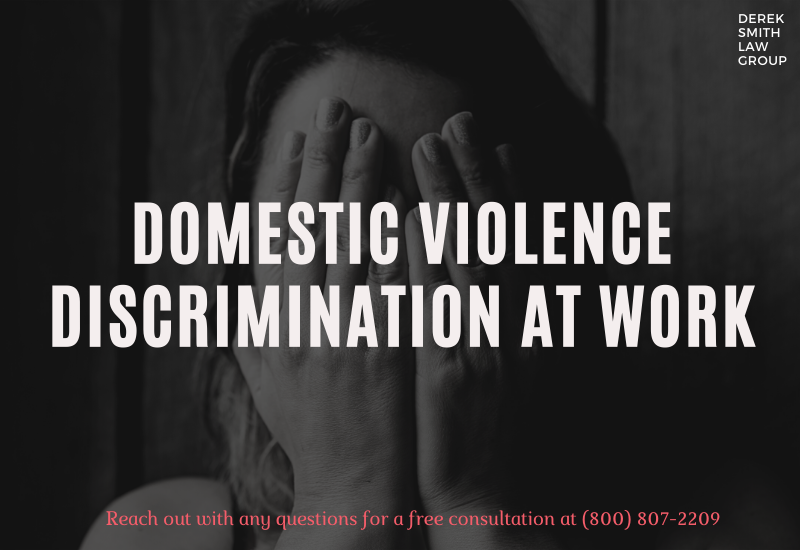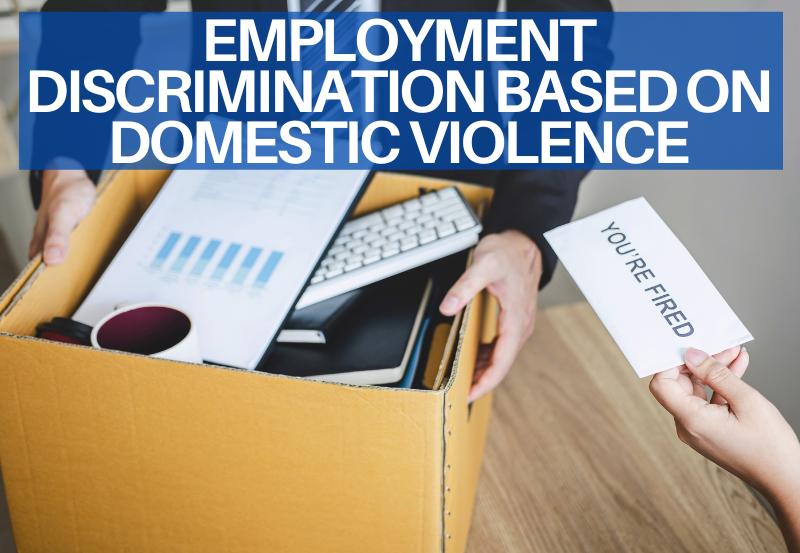State Laws Protect Domestic and Sexual Violence Survivors from Employment Discrimination in the Workplace
Many employees living with domestic violence report that the violence in their lives cost them their job. 50% of sexual assault victims report losing their jobs due to issues relating to the assault. Domestic violence discrimination often results in domestic and sexual violence victims getting fired from work or facing other forms of retaliation instead of receiving reasonable accommodations to help them get out of the situation.
It is illegal to terminate or retaliate against employees who take leave to attend court hearings, attend to medical concerns, move to a safe house, or otherwise deal with issues relating to abuse, harassment, or any form of domestic violence. However, employees must provide evidence certifying their status as domestic violence or abuse victim.
If your employer refuses to protect your rights as both a domestic violence victim and an employee in the workplace, you have a right to demand justice.
What Is Considered Domestic Violence Discrimination at Work?
Domestic violence is defined by physical and emotional abuse in the home. It often occurs between intimate partners (known as intimate partner abuse).

How Does Domestic Violence Discrimination at Work Occur?
Victims of domestic violence may have unexpected absences from work. They may need to unexpectedly go to the hospital due to injuries.
They may have to miss work to participate in safety planning or receive services from a domestic violence program.
They may have to attend court hearings for an emergency restraining order.
Employers may fear for the safety of others in their workplace when an employee deals with domestic violence.
When employees miss days of work or deal with violent individuals at home, employers may act without thinking, creating a cause for domestic violence discrimination.
Domestic Violence Discrimination Due to Missing Too Many Days of Work

However, employers may retaliate against employees for having serious issues at home rather than providing employees with accommodations to deal with these issues. Victims of domestic violence may get fired from work, demoted, lose shifts, or face other forms of punishment for missing workdays to deal with these issues instead of getting the time off they need.
Domestic Violence Discrimination Due to Fear of Danger in the Workplace
Employers may also terminate an employee because they fear the employee’s abuser will come into the workplace and create a problem for others. They fear the abuser may bring a gun or other weapon to the workplace to confront their victim.
Firing an employee dealing with domestic violence because of founded or unfounded fear is a form of wrongful termination and domestic violence discrimination. Instead of resorting to termination, an employer can provide extra security for the workplace, allow the victim to provide needed security, or find other ways to both accommodate the employee dealing with the domestic violence and protect the workplace.
When an employer makes any negative employment decisions against an employee because they are the victim of domestic violence, they are committing acts of domestic violence discrimination in the workplace.
What Laws Protect Employees from Domestic Violence Discrimination at Work?

California Laws Protecting Employees from Domestic Violence Discrimination at Work?
California laws provide victims of domestic violence, sexual assault, or stalking up to 12 weeks off from work for medical help, getting help at a domestic violence shelter or rape crisis center, receiving psychological counseling, or even moving or relocating to get away from their abuser. The leave applies to any victim of domestic violence who works with a California company with 25 or more employees.
To receive these protections, employees must give their employer notice that they need time off if it is possible.
Even if they cannot give notice of time off, they must let their employer know that they are dealing with a domestic violence situation to receive protection. Their employer must keep the situation confidential.
California Laws Prohibiting Workplace Retaliation as a Form of Domestic Violence Discrimination
California law also says no employee in any sized company can get fired from work, face employment discrimination, or face other forms of retaliation because they are victims of domestic violence, sexual assault, or stalking. However, you must let your boss know that you are dealing with the aftermath of domestic violence, sexual assault, or stalking to receive these protections against retaliation and domestic violence discrimination in the workplace.
California’s Reasonable Accommodations in the Workplace for Victims of Domestic Violence
Under California laws, an employer must provide employees dealing with domestic violence with reasonable accommodations to deal with the domestic violence, sexual assault, or stalking.
Reasonable accommodations may include some of the following actions:
- Assisting you in documenting all instances of domestic violence, sexual assault or stalking in the workplace
- Providing protections for victims of domestic violence, sexual assault, or stalking
- Providing time off from work to deal with court hearings, police reports, and medical issues relating to domestic violence, sexual assault, or stalking
- Discussing other options for reasonable accommodations to help protect victims of domestic violence, sexual assault, or stalking
California’s Paid Sick Time Law Protecting Employees Against Domestic Violence Discrimination at Work
California’s paid sick time law includes a “safe time” provision. Safe time is related to time off for victims of domestic violence, sexual assault, and stalking.
Employees earn an hour for every 30 hours worked. Employers may limit the safe time to 48 hours or six days. Employers may also limit the amount of paid sick time used in a year to 24 hours or three days.
Domestic violence victims can use this time to attend to any issues relating to domestic or sexual violence, such as Court hearings, doctor’s appointments, or safety planning meetings. Employees should receive paid time off for these meetings, appointments, and hearings without using their earned paid time off.
New York State’s Laws Prohibiting Domestic Violence Discrimination at Work
Victims of domestic violence are considered a protected class under New York State’s employment laws. Employees cannot face employment discrimination, retaliation, or wrongful termination when they ask for time off from work to attend Court hearings, attend to medical issues, seek a safe shelter, or deal with any other issues relating to domestic violence, sexual abuse, or stalking.
If you get fired from work, demoted, suspended, or get refused any reasonable accommodations to deal with any issues relating to domestic violence, your employer is breaking New York State’s domestic violence discrimination laws.
New York City’s Laws Prohibiting Domestic Violence Discrimination at Work
New York City bans employers from firing an employee or discriminating against an employee because they believe they are victims of domestic violence, sexual assault, rape, or stalking. Employers must make reasonable accommodations to allow victims of domestic violence the right to attend medical appointments or Court hearings relating to domestic violence.
The time off work may also include the right to meet with a social worker, advocate, safety planner, the District Attorney’s office, a financial counselor, filing a police report, or moving into a safe house.
New York City employers denying domestic violence victims this time off or otherwise retaliating against domestic violence victims for taking care of issues and concerns relating to domestic violence violate New York City’s domestic violence discrimination laws.
New York’s Paid Sick Leave Policy Protecting Employees from Domestic Violence Discrimination at Work
New York City also offers employees paid sick leave. Employees can use paid sick leave to take time off to deal with their own or a family member’s domestic violence issues. Employees are entitled to at least 40 hours of paid sick leave per year.
The law prohibits employers from terminating employees or retaliating against employees in an act of domestic violence discrimination because they used the paid sick leave to deal with domestic violence issues.
Family and Medical Leave Act Protecting Employees from Domestic Violence Discrimination at Work
FMLA leave can help employees in companies with 50 or more employees take time off from work to handle issues relating to domestic violence. Victims of domestic violence can use FMLA leave to take up to 12 weeks off per year to deal with medical issues. These medical issues can include any issues relating to domestic violence or sexual assault.
Employers cannot terminate employees or otherwise retaliate against them for using FMLA leave to deal with medical issues relating to domestic violence or sexual assault. Any violation of the FMLA to deal with such issues is an act of domestic violence discrimination.
How Can a Sexual Harassment and Discrimination Lawyer Help You Fight Domestic Violence Discrimination at Work?
An experienced employment discrimination lawyer can help you protect your rights as a victim of domestic violence discrimination in the workplace. They can help you prepare your complaint for Court. However, before filing the claim in the proper Court for your state, they can help you negotiate a conclusion with your employer.
Your employment lawyer can help advocate for your rights as a victim of domestic violence discrimination in the workplace. They can help you get your job back if that is the outcome you want. However, they can also help you get the compensation you deserve.
Whether you need a talented employment lawyer to help you negotiate a settlement or stand by your side in Court, your employment discrimination attorney can help you protect your rights and fight for justice against domestic violence discrimination in the workplace.
Dedicated to the Protection of Your Rights as an Employee
Being a victim of domestic violence is a lot for one person to handle. You should not have to face retaliation and wrongful termination in the workplace due to domestic violence discrimination as well.
The Derek Smith Law Group in New York, New Jersey, Philadelphia, Miami, and Los Angeles helps employees battle domestic violence discrimination, and sexual harassment in the workplace.
Are you currently in counseling or therapy due to sexual abuse or domestic violence? Do you worry about getting fired from work for taking time off to attend your sessions? Is your employer giving you a problem for taking time off to go to Court?
California and New York employment laws provide you protections against getting fired from work in retaliation for taking leave to ensure the safety and well-being of yourself and your children.
